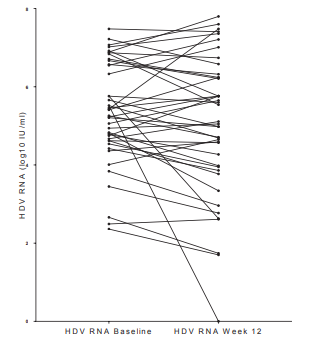Background/Aims: Sodium taurocholate co-transporting polypeptide (NTCP) is the receptor for the hepatitis B virus (HBV) and hepatitis D virus (HDV) entry into hepatocytes. Ezetimibe is a cholesterol-lowering drug that possesses the pharmacophore features to inhibit NTCP. This study evaluates the efficacy of ezetimibe in patients with chronic HDV infection in a nonrandomized trial.
Materials and Methods: This proof of concept phase 2 trial evaluated the efficacy and safety of ezetimibe 10 mg daily in (interferon treatment-experienced or interferon ineligible) patients with chronic hepatitis D (CHD). Forty-four patients with CHD were recruited, 38 male and 6 female patients, mean age 35.2±8.7 (range 19-64). Fifteen (34%) patients were on concomitant nucleoside therapy, and cirrhosis was present in 14 subjects. The primary therapeutic endpoint was a decline in HDV RNA at one log or more from the baseline at week 12.
Results: The mean HDV RNA level was 5.4±1.3 log10 IU/mL. HBeAg was non-reactive in 43 (98%). HBV DNA was undetectable in 28 (64%). One patient stopped treatment at week 4, and one patient did not follow-up. One log or more reduction in the HDV RNA levels was observed in 18/44 (41%) patients. No log reduction occurred in 16 patients, and 8 experienced a log increase. No adverse effects from the concomitant nucleoside analogue use or clinical cirrhosis were observed. The drug exhibited a positive safety profile.
Conclusion: Treatment of CHD patients with ezetimibe resulted in a one log reduction of viral load in 43% (18/42) of the patients who completed the 12 weeks of therapy.
Cite this article as: Abbas Z, Saad M, Asim M, Abbas M, Samejo SA. The effect of twelve weeks of treatment with ezetimibe on HDV RNA level in patients with chronic hepatitis D. Turk J Gastroenterol 2020; 31(2): 136-41.




.png)
.png)
